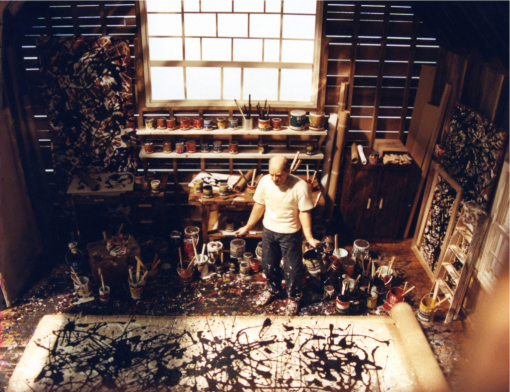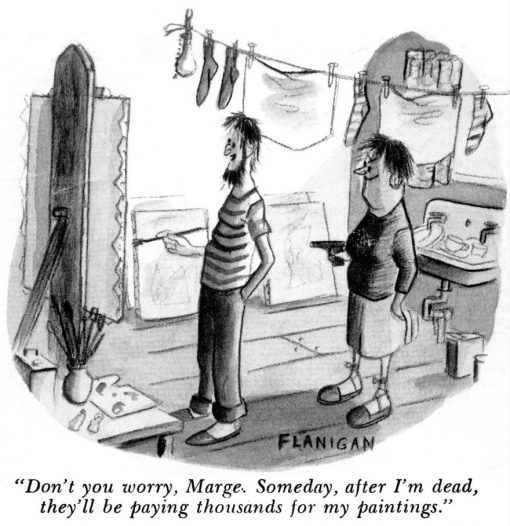Art is important. Art can anchor humans or sweep them away, and a world without art would just be financial and grey. I would even go so far as to say that a society without art would hardly be worth sharing in.
Art, as used here, is a term for describing products that are creative for the sake of creativity, such as music, literature and film, as well as paintings and multimedia installations. Without music you would never be able to sing in the shower, now doesn’t that thought just horrify you? Art needs artists, so how does society make them?
A student could discover at an early age that they are Michelangelo reincarnate and bend their entire lives around a calling. They might study art at school, then at college and university. Possibly they would then starve slowly into submission before giving in and working at McDonald’s for a few years before finally getting a job in an office. The formative years of a career in a purely creative art form are unlikely to result in a diet of food, or the payment of rent.
It is ridiculous to expect a child of sixteen to decide on a career that will keep them satisfied for their entire lives, yet children in the British education system are encouraged to pursue college and university subsequent to school. Because of the subject based entry requirements for most university courses, a child that bows to pressure and follows this path will rapidly find themselves locked out of the other options that were previously open to them. The journey through decision paralysis into a career of necessity has doubtless lost the world many potential artistic wizards.
So, is the budding artist damned if they choose their perfect career path out of the tombola and damned if they accidentally pick accounting? Of course not, but the remaining route can leave the artist feeling as though they lack credibility. An artist does not need to attend a university in order to produce beautiful art, and in many ways the individuality and uniqueness of such art can outstrip the technique or understanding that a graduate might obtain. The full time art student lives on time that is borrowed from the government, though, and has the option of bending their entire lives around their calling, at least for a short period. The rest of us do not.
Instead, we must work for more than a mere living: networking opportunities, art materials, inspirational experiences and brain food all cost more than a television license and a sofa. We will have focused on improving our portfolio to the expense of our CV, and so our wage is typically low, often leading us to a second job; we trade our valuable time for invaluable basics. Possibly, we recognise that for all of our insight and creativity, we don’t have all of the answers and we might commit our evenings and weekends to study. By the end of the week, we have hardly had time to produce any art at all.
But credibility is important: it is difficult to network with the people that might make us future when we have insufficient proof to make them credulous of our hobby careers. Many of us are mild mannered enough not to push ourselves melodramatically into the art world, desperately blowing our own bugles to make ourselves seem credible. In case there weren’t enough obstacles between us and credibility, art can be said to defy definition. The term may suitably be used to cover all works in a spectrum that includes both the hitherto unknown ingenious composer in her parents’ loft and the notoriously wealthy creator of controversial con-art, Tracy Emming. Given the fluid nature of the concept, the artist’s definition of art is often less important than the viewer’s, and an artist’s ability to convince others of their credibility can often be the most important skill in their repertoire.
How, then, does an artist producing avant garde work, or working so hard to fund their art that they hardly produce any, convince others that they are indeed an artist? Are they, indeed, an artist? Any definition, in this respect, will be necessarily subjective. It can be accurately assumed that it is not enough to be a retail store manager who paints flowers to relax. An artist must be a person that dedicates themselves to their cause, or one with such an undeniable level of skill that any viewer will be awed. It is entirely possible for a bank manager to possess the skill of a famous painter, but to lack the drive to paint. It is also possible for a person that works full time to fund their art, studies in the evenings and produces the odd sample of music to create horrible nails-down-chalkboard music that leaves them without an audience of any sort. Are these two examples of artists? Probably not.
But you are, aren’t you? All you need is to make sure that others will see you that way. There is no certain way to gain instant credibility, short of patience and hard work. Oscar Wilde famously claimed ‘The harder I work, the luckier I get’, and ideally you want to be earning money through your art at the earliest stage, though, so you need to produce as much art as you can in the scant time available in order to encourage your luck. This art needs to be to your highest standard in order to offset any infrequency. When you produce this art, don’t be afraid to ask for money off anyone that would be willing to buy, but don’t get greedy. The artist starved artist is no good to anybody, but the artist without an audience is entirely unfulfilled, so don’t underestimate the value of exposure.
Working in a shop does nothing to reinforce the skills of the artist, so if you are going down the route of financially subsidising your own artistic endeavors, be patient with your art and redirect some of your focus towards a career with a parallel skill set. If you draw or paint, consider retraining as a graphic artist before pursuing your individual style. If you write creatively, consider putting your would-be novel on hold to write about credit cards, cars or football. If you want to compose an infamous symphony of jazz-dubstep fusion, don’t discount writing jingles for radio advertisements. Photographers can do weddings and baby photos. Do your research thoroughly, too; the above examples are probably all rubbish, but there is a market for what you do, in spite of any discouraging platitudes that others might self-consciously spew. Whilst on the topic of platitudes, don’t follow your dreams like a dog chasing a car, be clever about it and approach your dream job from the side: find your credibility in your parallel career and make that short jump to your ideal.
Above all, don’t ever refer to yourself as anything but an artist. The force of your commitment will sometimes be enough to sway non-believers. It is a cliché, but fervent and unshakeable belief in yourself can be a skeleton key to open yourself to self actualisation. When self belief is achieved from perceived external verification, there is always likely to be a vein of truth to mine, even if your audience is a figment. If your inflated ego is the ore of this vein, it is still more valuable than an ego made from empty stone, so treasure it until you have the tools to smelt.
You can find more of Sam’s work, fact and fiction, on his WordPress
Some of the coverage you find on Cultured Vultures contains affiliate links, which provide us with small commissions based on purchases made from visiting our site.





